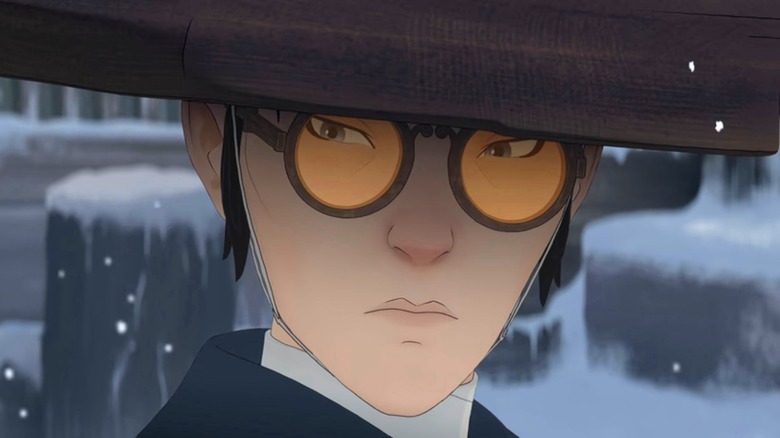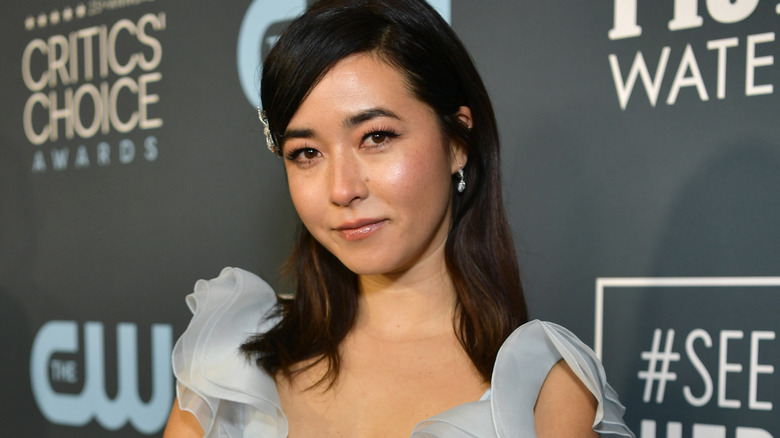Blue Eye Samurai: Who Voices Mizu In The Netflix Anime?
There are more worthwhile anime shows and cartoons on Netflix than its subscribers may think, including "Blue Eye Samurai." The critically acclaimed drama, which premiered on Netflix in early November, has already garnered a lot of attention and praise online, and it's not hard to see why. From its stunning visual style to its endlessly satisfying riffs on well-known genre tropes, "Blue Eye Samurai" has plenty to offer to both die-hard animation fans and casual viewers alike. While the series features a handful of memorable performances as well, none of its characters make as much of an impact as its mixed-race protagonist, Mizu, who is voiced by Maya Erskine.
Mizu is a driven warrior in the same vein as the kind of iconic samurai and cowboy characters once played by the likes of Toshiro Mifune and Clint Eastwood. Despite that fact, Erskine herself hasn't built her career by playing brooding figures like her "Blue Eye Samurai" character. Instead, she's perhaps best known among TV viewers for her work as one of the stars and co-creators of the acclaimed Hulu comedy "PEN15."
In addition to her role on that series, she played Maggie on FXX's "Man Seeking Woman," Diane Nakamura on HBO's "Insecure," Rae on Hulu's "Casual," and Sully on Disney+'s "Obi-Wan Kenobi." In 2019, she also starred opposite Jack Quaid in the charming, underrated rom-com "Plus One."
Blue Eye Samurai's creators only wanted Maya Erskine to play Mizu
Those familiar with her past work may be surprised to learn that it's Maya Erskine who plays Mizu on "Blue Eye Samurai." After all, Erskine is primarily known for her comedic work and, therefore, hasn't ever played a character quite as intense or tormented as Mizu in any other movie or TV show. Nonetheless, it turns out that Erskine was "Blue Eye Samurai" creators Michael Green and Amber Noizumi's first and only choice for the role. Green admitted as much in an interview with Netflix's Tudum, telling the outlet, "If we didn't have Maya Erskine, there was no second choice for Mizu."
Noizumi, notably, first became aware of Erskine's talent while watching "PEN15," and she quickly began to feel a real kinship with the actor, who also grew up as a mixed-race Japanese woman in Southern California. "Sometimes I would watch her and knew that she felt my pain," Noizumi reveals. "She far exceeded our expectations as Mizu."
Over the course of "Blue Eye Samurai" Season 1, viewers watch as Mizu, who routinely wears orange-tinted glasses to hide her blue eyes and poses as a man in public, slowly begins to move past some of her many shortcomings on her path toward revenge. As the character, Erskine brings additional depth and complexity to every single thing that Mizu says and does. While she grows a lot throughout the series' first eight episodes, too, the ending of "Blue Eye Samurai" Season 1 opens the door for her to keep evolving in new and exciting ways. That, in turn, means that Erskine's performance may continue to grow more complex and emotionally nuanced moving forward.
As anyone who has seen "Blue Eye Samurai" will attest, that's saying quite a lot.

